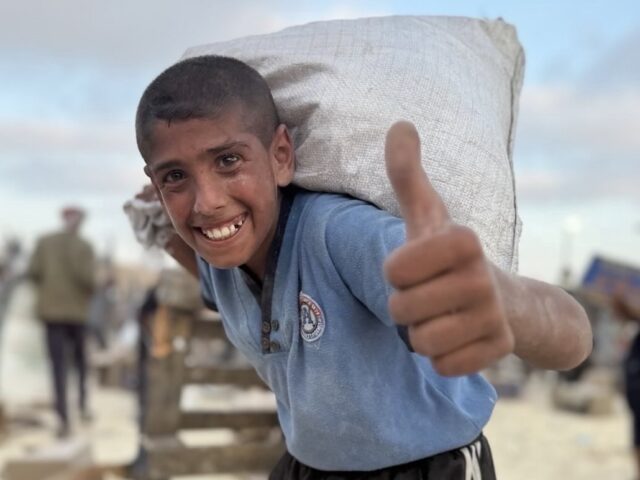Col. Richard Kemp: Feeding Gaza Means Facing Reality

Last week I crossed into Gaza with a Gaza Humanitarian Foundation (GHF) security convoy. What I saw at the GHF distribution base was both distressing and uplifting. Tens of thousands of people desperate for food pouring into the place, wide-eyed at the piles of aid boxes. But now actually getting their hands on the flour, sugar, cooking oil and other commodities they need to survive.
Several of them told me that, until GHF began working a month ago, they’d received hardly any free aid at all for a very long time. Now they can get it and are movingly grateful, with several telling me: “I love America”.
Many also said “kill Hamas”, which was met with cheers from those nearby, because they all know it is Hamas that has brought the death and destruction all around them, and on top of that have been depriving them of food.
Inside Gaza, Hamas controls everything. There is no neutrality here, as much as those who defend the status quo want to believe it. There is barely any aid getting to civilians—and certainly not at scale. UN convoys haven’t reached their destinations in days. They’re looted before they ever make it across–if they can even find drivers willing to brave the journey.
Criminal gangs, armed terrorists, and desperate civilians are all converging on unsecured aid convoys—and people are being killed in the chaos. Shootouts are erupting during looting attempts, with civilians caught in the crossfire. But you wouldn’t know it from the official casualty reports, which are filtered through a Hamas-controlled Ministry of Health that routinely downplays these incidents and obscures the true picture on the ground.
Traditional humanitarian actors have grown comfortable with this setup. They’ve told themselves that preserving their idea of neutrality means they must preserve access to aid.
GHF isn’t a perfect solution, nor have they pretended to be. It is, however, a real solution that is built for the world as it is, not the one we may wish existed.
Secure delivery? That’s not a radical idea. The UN and other non-governmental organizations (NGOs) use private security or police escorts routinely in high-risk environments. I myself have been involved in this in the past.
What’s different in Gaza is the level of discomfort it creates—because it breaks with the inertia that has defined humanitarian operations there for years.
Hamas hates the GHF for wresting control of aid from them, as several Gazans confirmed to me. That’s not surprising but the equal opposition of much of the aid community certainly should be. It is deeply misplaced and reflects a stubborn unwillingness to adapt to a radically changed landscape. Or to think outside the box in the middle of a humanitarian catastrophe.
Some in the humanitarian establishment seem more committed to the idea of how aid should be delivered than whether it actually is. That’s how we ended up in a situation where GHF is the only organization consistently feeding people across Gaza, while others sit back and hurl criticisms from afar. It’s easy to write op-eds from Geneva or Jerusalem. It’s harder to walk into Gaza, stare down a hungry crowd, and keep the line from breaking.
GHF is not trying to replace anyone; in fact they are quietly working with a number of NGOs to get their aid into Gaza. I say quietly, because these groups are blackballed by the UN for cooperating with GHF on the one hand, and threatened with death by Hamas on the other.
Let that sink in.
And they have extended a hand to international organizations to work with them or to propose better solutions that meet Israel’s security concerns while also getting food to those who need it desperately. A courageous few who can no longer look away are quietly starting to engage, hoping they won’t be discovered and canceled, too.
In the face of a humanitarian tragedy, the aid community needs to decide what it’s going to be: self-righteous or effective. I hope they choose the latter. But that requires honesty about the operating environment and a willingness to adapt. Sitting on the sidelines criticizing a flawed but functional model while doing nothing to feed people—that’s not humanitarianism. That’s hubris.
If you’ve seen what I’ve seen, and what GHF staff see every day as they do what they can to meet the needs of the Gazan people, you wouldn’t be asking why they’re doing it. You’d be asking why more people aren’t.
Col. Richard Kemp is a former British Army commander who served in Afghanistan, Iraq, Northern Ireland and the Balkans wars.